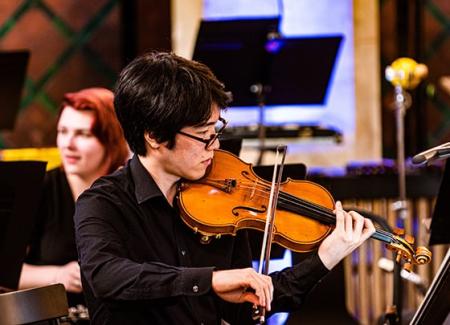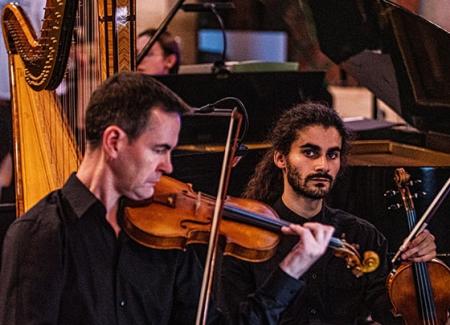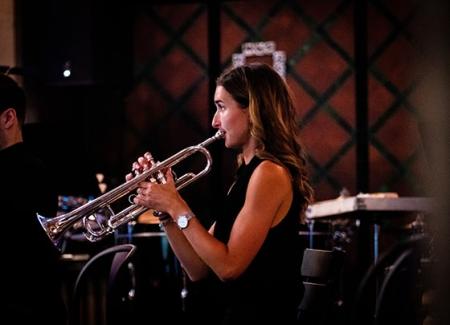The 2023-24 season will see the start of the London Sinfonietta Academy Pathways, designed to seek out emerging musicians who are facing barriers that are preventing them from confidently pursuing a career in performing music, and particularly contemporary classical music. We are doing this in order to increase the range and diversity of musicians applying to our annual London Sinfonietta Academy.
The London Sinfonietta Academy Pathways programme consists of three kinds of activity: workshops on skills in contemporary music, led by workshop leader Fraser Trainer; masterclasses on contemporary repertoire with London Sinfonietta musicians; and a rehearsal day as a London Sinfonietta sized ensemble, focusing on core pieces of contemporary repertoire, with an informal performance at the end of the day.
Activity began in October 2023 when 12 string players from Trinity Laban Conservatoire of Music and Dance played Ligeti's Ramifcations in the Queen Elizabeth Hall foyer as part of a day celebrating Ligeti's music. The work will continue with 14 of the workshop and masterclass sessions delivered by March 2024. There will be three rehearsal days taking place between April and June 2024.
Over the next year we will work with students at:
- Trinity Laban Conservatoire of Music and Dance
- Goldsmiths, University of London
- London College of Music, University of West London
- University of York
- Leeds Conservatoire
- University of Southhampton
- University of Bristol
Since 2009, there have been 14 editions of the London Sinfonietta Academy, training 272 instrumentalists and 40 conductors. The programme focuses solely on the expert playing of contemporary repertoire and many of the participants have become players with the London Sinfonietta and members of other major UK and international ensembles.
During our 2022-23 season, we commissioned independent consultant Judith Robinson to conduct a review of the academy and consult with schools, higher education institutions and arts organisations. The report found that:
- The gender of Academy participants is evenly split with 50% Women, 49% Men (for the remaining 1% data is missing)
- Regarding ethnic diversity, the vast majority of participants have been White British, with 5% being Asian and 1% Black. This is not representative of the British population, where in the 2021 census 74.4% were White British, 9.4% were Asian, 7.4% White Other, 4% Black, 2.9% Mixed and 2.2% Other**
- Data on disability of participants has been collected since 2017, with 4% of participants identifying as disabled. This is also not representative of the British population where 1 in 4 adults identify as disabled.
- Data on neurodiversity has been collected in the past two years, with 17% of participants identifying as neurodivergent. This is closer to the national average of 20% of people identifying as neurodivergent.
- Questions relating to socio-economic background have been asked in the past two years, with greater proportions of applications and participants coming from more affluent backgrounds, measured through the occupations of main income earner in household when aged 14.
- Education, also an indicator of socio-economic background has shown that 33% of applicants and 27% of participants attended school outside of the UK and 27% of participants went to a fee-paying school (the national figure is 7%).
** UK Government 2022: Population of England and Wales according to the 2021 census: https://www.ethnicity-facts-figures.service.gov.uk/uk-population-by-ethnicity/national-and-regional-populations/population-of-england-and-wales/latest
Through interviews with representatives of higher education music departments the report found that the current issues stem from the decline of music in secondary schools where the overall uptake of GCSE and A-level music has fallen 36% and 45% respectively since 2010 when the English Baccalaureate (EBacc) was introduced. Recruitment for students is becoming increasingly difficult; more students are from middle-class families and disproportionate representation of students from independent schools. Increasingly students do not have strong orchestral instrumental skills and as a result some departments are expanding their offer to electronic, pop and rock instruments and becoming more inclusive with genres and courses on offer. The report provides a detailed list of the barriers facing diverse young musicians and direct actions that could be taken with a refreshed London Sinfonietta Academy programme.
As the programme enters its 15th year, we recognise that it is time to reevaluate the aims and ambitions for the London Sinfonietta Academy and where it sits within the cultural and educational landscape today. We want to understand how we can play our part in diversifying the UK classical music sector, which we know is not representative of the UK in terms of ethnicity, disability and socio-economic background. During the 2023-24 season, London Sinfonietta players and management team are considering how to address these issues in an impactful yet sustainable way for the organisation. In our 2024-25 season we will announce how the London Sinfonietta Academy will look going forward.


